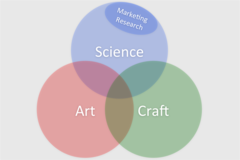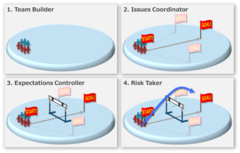Let me Interpret the Future of 9 Technology Buzzwords on the Context of Marketing Research

Technology buzzwords are getting much attention on SNS, news and some expos while I'm scared of not how fast technologies advance but how fast they turn into buzzwords. This issue should be named the "Rapid Buzzwordization".
Buzzwordization is a great chance for enterprises which has been making efforts in that realm because it picks up hidden technologies and phenomenon and gives social attention to them.
But rapid buzzwordization often invites a reflexive communication without thinking deeply, such as "It sounds like a trend. Shall we try it?". This ends up being a product-oriented market expansion, which lacks important perspectives of user's values and eliminates a great possibility which the technology originally has. This is "mottainai".
In addition, it is quite bothering to see some enterprises try to earn money by mentioning buzzwords without understanding the essence of technologies. It simply dissatisfies potential customers. I don't like such enterprises, but they appear not to be a minority.
However, as a man of marketing industry, I need to interpret technology buzzwords on the context of a specific industry so that I take advantage of their potentials. I reckon that such discussions often end up bringing about premature suggestions, but I would be very glad if some people agree with my positive-but-challenging future, or if some people make their own arguments to criticize my arguments.
This is why I try to interpret the future of 9 technology buzzwords on the context of marketing research industry which I'm engaged in a lot.
*This post is my private argument so it is not relevant to any organizations.
The Future of 9 Technology Buzzwords
1.Big data
On the context of marketing research, the significance of big data is a fiercer competition of "data source for decision-making" market. Specifically speaking, it includes an acquisition of citizenship by passive data and a relative weakening of active data (asking data).
- Client companies, which are costumed to conduct marketing research for decision-making, are now enabled to collect a massive data for decision-making other than marketing research. Some prioritize passive data on the point of quality and property, and some end up abandoning marketing research intentionally or make light of marketing research.
- Marketing research companies are compelled to compete with big data on the "data source for decision-making" market by getting well aware of various big data so that they can discuss superiorities of what is called marketing research. It is very likely that the discussion of data quality, which tends to be made light of these days, obtains much more attention in the point of comparative advantage with big data. Then, they will review biases on each of the four steps - sampling, asking, processing and analysis.
- And, there will be more and more marketing research companies which start contracting for analysis of passive data client companies own so that they survive in this market.
- Yet, the spread of big data is likely to reduce the cost of data utilization and promote the spread of data-driven decision-making rapidly. Then, marketing research can find a new value in itself to recognize consumer awareness which passive data cannot analyze.
2.IoT
On the context of marketing research, the significance of IoT is that we now can collect passive data of people other than those surfing online in front of PC, that is, those who are taking a move.
- Methods of marketing research are basically categorized as questionnaire, interview, and ethnography, and none of them enable us to collect continuous data because of a burden on participants.
- However, the utilization of IoT, especially the smart devices such as wearables, enabled us to collect continuous real-time data of participants. Available data includes macro location data like geolocation, micro location data like body actions, biometric data like body temperature and heart beats, and even what they see and hear.
- Furthermore, data collection by sensors enabled us to collect data based on locations while conventional marketing research collects data based on humans. If marketing research companies can design appropriate sensor settings by themselves, they will be able to propose total data management to client companies which owns brick-and-mortar shops.
- Yet, one big problem for conventional marketing research companies is that they tend to think of IoT utilization during a short period of one survey, which ends up being to expensive to conduct. The key of IoT utilization is whether to cooperate with a nice platform business outside, or whether to adopt a platform business model by themselves to invest in advance for a long-term utilization.
3.VR
On the context of marketing research, the significance of VR is a replace of current services by virtual space utilization in the short or medium term, and a market destruction by data source monopoly in the long term.
- We must pay attention to virtual space utilization in the short term. It is often tough to get a permission to use brick-and-mortar shops or to reproduce product shelf appearance inside a field work facility while ethnography at such places are a typical research method of marketing research. In that sense, virtual space is great in that it is easy to prepare. Yet, it costs huge amount of money to build a virtual space at an initial time so we need to recover initial costs by utilizing a generic platform built by a necessary initial investment. Virtual space is not suitable for research projects in which any of three senses - smell, touch and taste - are important. Plus, we must note that it is not good in picture quality but is easy to collect eye tracking data.
- In the medium term, we must note that the virtual space utilization becomes available online after a spread of VR devices among ordinary homes. Since VR devices are not yet common, central location test is better to conduct virtual space utilization. Yet, the expected future spread of VR devices will enable us to conduct VR research as if we were trying an online survey. Of course it requires a panel of VR holders, but it offers you a further cost reduction and a faster performance.
- In the long term, I would like to mention a possible "data source monopoly" by VR platform businesses as a destructive innovation. Technology development will enable VR platform businesses alone to collect all passive data in their virtual spaces while people start spending much time and consume naturally in expanded VR worlds. Plus, research is available almost freely, automatically, and exclusively inside VR spaces. This suggests a future of conventional e-commerce defeated by VR, which is like mass retailers defeated by e-commerce and shopping streets defeated by mass retailers in the past.
- I reckon that it will take much more time before consumer behaviors inside VR go beyond real ones. But an uxpected technology development might cause a sudden rapid spread. Marketing reseach companies will be forced to change themselves dramatically when VR gets much more common under newly-arranged laws.
4.AR
On the context of marketing research, the significance of AR is an optimization of survey experiences by non-device asking.
- It's been long since they started suggesting device-agnostic asking methods in the marketing research industry, but AR enables us to draw objects on a real space directly and realize none-device asking. This appears to be the most natural survey experience inside participants' daily lives, and the spread of AR might make asking methods through PC and smartphones too old to use.
- None-device asking gets along with voice input and artificial intelligence. Plus, unexpected technology development will surely change possible communication scenes in the future. Yet, the spread of AR requires a technology development - the same as VR, and it takes much time.
5.Neuromarketing
On the context of marketing research, the significance of neuromarketing is a possible daily collection of both action data and awareness data (biometric data) by combination of VR.
- The strength of neuromarketing is to enable us to collect awareness data continually in real-time, which conventionally can be collected by asking. Yet, for now, neuromarketing is limited to experimental uses because of technological and financial difficulties, which ends up spoiling its possible great strength of continuousness.
- We require action data which changes in seconds so that we interpret awareness data which changes in seconds. Plus, we require a system in which analyze both data in real-time and determines which actions to take in real-time. But such a system is yet to be realized. But if both hardwares and softwares of VR develop greatly so that they can collect continuous biometric data, the great potentials of neuromarketing will scarily increase the exclusive value of VR mentioned above.
6.AI
On the context of marketing research, the significance of AI is a realization of overwhelming speed and a market destruction in very labor-intensive marketing research operations.
- It is very important to see AI not only as an original word "artificial intelligence", but also as an word "augmented intelligence".
- The former, an aspect of artificial intelligence, suggests an automation from planning to analysis of marketing research by arranging multiple patterns and scenarios of online survey. Try and error by human powers are still promising in this development process, but deep learning technology based on possible structured knowledge will cause a dramatic revolution.
- Plus, demanded auto-anaysis of a large amount of texts, images and sounds will go beyond a practical level so it will radically change the labor-intensive business model of marketing research.
- The latter, an aspect of augmented intelligence, suggests a potential communication system which suggests organized research knowledge, which has been hidden inside each individual researcher. This system will realize the world in which clients themselves communicate with machines and conduct research, of course without researchers. According to Ray Poynter's words, human resources like Client Success Managers, Bespoke Researchers, Entrepreneurs/Intrapreneurs, People creating or driving AI systems, Performers are expected to succeed in this world.
- In addition, further technology developments might make research projects as easy as buying a drink from a vending machine after deep learning technology is successful in calculating essential features of human responses to various research questions and answers to you instead of human respondents. Conventional research methods, too, do not guarantee your perfect success so what is called "research vending machine" can be a replacement if it is as reliable as conventional ones.
7.MA
On the context of marketing research, the significance of MA is an appearance of a new competitor as an upward compatibility which includes research functions.
- Ordinary clients place an order to marketing research companies because conducting conventional marketing research requires not only technical systems, skills and experiences but also respondents. But an advancement of MA has made such clients focus on communications with customers on their lists. Further, they tend to design consistent brand experiences by including research functions as a part of communication with their customers.
- As a result, such clients do conduct marketing research towards users on MA platforms so they have less and less occasions to use research platforms of marketing research companies (Please note that these platforms are outside MA for them).
- In the point of "marketing research for users" market, favorable strategies for marketing research companies are as follows - whether to try offering MA by oneself, whether to start offering professional research SDK which can be used in other enterprises' MA platforms, whether to establish a position to offer neutral user surveys separated from brand experiences, or whether to do business with clients which do not have MA.
- Of course, marketing research companies can focus on fields other than marketing research for users. But this is an unignorable big disadvantage for marketing research companies not to cooperate in the field of the biggest part of fact-finding surveys.
8.Omnichannel
On the context of marketing research, the significance of omnichannel is whether the customer journey analysis, which describes one or a few idealistic figure, can keep offering business values.
- Omnichannel strategy, a marketing strategy which considers multiple user touch points including both online and offline ones, gets more and more attention as more and more people purchase online and search online. Of course, they demand research analysis based on omnichannel when they require fact-finding of market and effectiveness measurement of marketing actions. However, omnichannel requires a lot to be considered a complicated consumer behavior scenarios so it's hard to design asking for quantitative analysis. This is why qualitative customer journey analysis by in-depth interview is more effective in this field.
- But as channels have been more and more complicated, further spread of one-to-one marketing by MA will increase potential needs for individual customers. Then, customer journey based on qualitative research will become unable to satisfy their needs.
- In the medium and long term, a possible appearance of single-source passive data which captures the whole of omunichannel, together with an improved analysis capacity, will bring about a prosperity of passive data analysis. Then, the important point is whether customer journey analysis based on qualitative research which abstract realities can keep offering more business values than passive data analysis which recognize complicated realities for one-to-one marketing.
9.Sharing Economy
On the context of marketing research, the significance of sharing economy is whether the consumption behavior models, which abstract realities, can keep offering business values.
- Conventional consumer behaviors are described as buying products at shops and stores of limited numbers so brand experiences can be designed simply like a funnel. Although we are already in the world of omnichannel including online purchase, it simply means diversified channels so funnels are not diversified. (Yet, as the model of Dual AISAS insists, funnels themselves can be recognized as very complicated.)
- But under sharing economy, new consumer behaviors impossible-ever-before can appear. For example, we can clearly see the sayings like "I do not buy or own the brand, but I love it and use it often", "I use it first, and if I love it, I keep it. And if not, I return it", and "I buy not what I want, but what others want". Conventional consumer behaviors are based on egoistic decision-making and funnel-like recognition so it is hard for them to describe a variety of out-of-rail consumer behaviors.
- The important point is, like the discussion of omnichannel, whether the consumer behavior models, which abstract realities, can keep offering more business values than the potential unclear technologies which recognize chaos realities. If the phenomenon of sharing economy is to advance, it will not side with the conventional models.
Conclusion
My objective so far is to describe such stories as easy-to-understand as possible because I see the stories above are very hard to understand.
Plus, although I have plenty of other buzzwords which I've wanted to write about, I gave up writing stories about them because of my lack of knowledge. Especially, I must note the buzzword "brockchain". Probably this buzzword will drastically change the market, but I'm not yet ready to write about it. I need to learn more.
Besides, what I want to tell you through this post is that I'm willing to discuss such issues with you guys. If you are a person who likes such discussions, we are very likely to do nice businesses somewhere sometime.






- Business (6)
- Childcare (1)
- Food (19)
- Languages (2)
- Life Hack (1)
- Local Revitalization (69)
- Photography (571)
- Web Design (11)